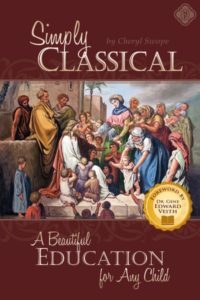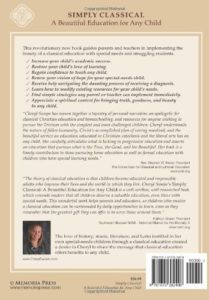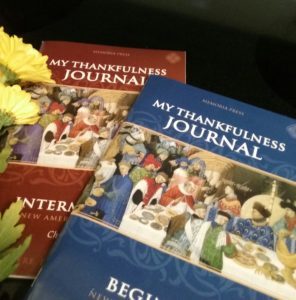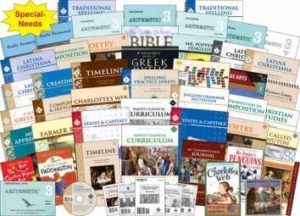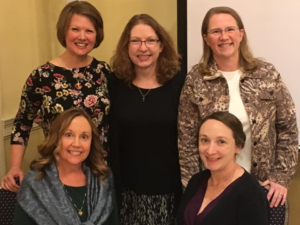Cheryl Swope's Blog, page 7
December 24, 2018
Help Us
For Christmastide, Michelle’s poem:
Help Us
Save us now,
God’s chosen race,
From this unglorious
Sinister place.
A mean allotment
Is our view
From sin, distraction,
Bereavement too.
Save us now,
By Your mighty hand,
Lead us now
To your chosen land.
Dismay, despair,
Keen alloy,
Plot to take
Our every spoil.
Spare us, Lord,
And with Your grace,
Lead us where
We will be safe.
Angels hearken
Now to see
Rain has fallen
Over thee.
God be with us
In Thy quest.
Here comes Jesus,
Eternal rest.
by Michelle Swope
December 18, 2018
Celebrating 5-Year Anniversary of Simply Classical, Sale: $15 (Reg. $24.95)
Enjoy winter reading with this first-ever sale price of $15. Schools call it “the first in-service book club any headmaster should conduct.” (Dr. T in Wyoming)
Whether for your school faculty, teacher-training, homeschool cottage school or co-op, or for your own personal winter refreshment, we invite you to visit Memoria Press through the link – Simply Classical: A Beautiful Education for Any Child. The winter sale is for a limited time.
This book sale celebrates 5 years of gratefully hearing words like these:
“An outstanding book – full of honesty, information, and hope. I have read through it several times and take away something each and every time. Highly recommend.” – Cynthia
Sale provided compliments of Memoria Press, leading the way in classical education for all children of all ages and abilities.
A blessed Advent & Christmastide to all –
Cheryl
December 10, 2018
Teaching Thankfulness
Children receive many gifts this time of year. Let us teach them thankfulness as they receive!
“I would maintain that thanks are the highest form of thought; and that gratitude is happiness doubled by wonder.” G.K. Chesterton
As young as three and four, a child can express his thanks as a parent writes his words for him onto a note. By six or seven, he can write his own notes to Grandma and Grandpa or anyone who gives him a gift. Using lined paper for young children or for any child with dysgraphia can help legibility.
Thankfulness need not be limited to sending thank-you notes, although thank-you notes are an important place to begin. Daily gratitude can fight self-pity, boost physical health, counter depressive tendencies, and even improve relationships according to research. We help our children – especially those with mental illness, anxiety, depression, or challenges such as special needs – when we teach them to find something (anything) for which to give thanks.
For this reason we created My Thankfulness Journals, Initially they can be “scribed” (i.e., dictated by the child as the parent or teacher writes), but by age 7 o 8, children can write in their own journals. Provide pre-writing prompts by category each day: foods you enjoyed today, places you visited, people you saw or met, something about the weather or nature, pets or animals, games you played. After brainstorming – perhaps accompanied by writing these with correct spelling on the board for the child to copy – he writes on his own.
Enhancing the Experience
Some families light candles during the special thankfulness writing. Others, like our family, save thankfulness for the end of the day. Just before bed, our children each write. My daughter prefers the Beginner version in a simple list format, and my son prefers the Intermediate version into which he can write more thoughtful paragraphs. Some homeschooling families use these journals for writing practice during the school day. Some churches include these in their Sunday School lessons. No matter how or when you choose to teach thankfulness, the habit will serve the child well.
More than this, being thankful reminds us that “every good and perfect gift is from above.” For this reason, each page includes a verse to help our children – and us – remember.
My Thankfulness Journals are now included in the latest Simply Classical package: Grammar, Greece, and Gratitude, but can also be purchased separately as stand-alone resources for home, church, or school.
Let them give thanks to the Lord for his unfailing love
and his wonderful deeds for mankind,
for he satisfies the thirsty
and fills the hungry with good things. (Psalm 107:8-9)
December 6, 2018
Simply Classical Curriculum Levels 5 & 6 Released Today!
We are so pleased to announce the arrival of two new levels in the Simply Classical Curriculum to schools and homeschools for children with autism, learning disabilities, Down syndrome, and other special needs. We now offer nine levels including A, B, C Readiness.
Simply Classical Levels 5 & 6 are offered in Two-Year Standard pacing with additional multisensory strategies, more review, and a much gentler pace or a One-Year Accelerated program.
Features of the Simply Classical Curriculum at every level for children ages 2 and above (skills or chronological age) follow:
– Free online readiness assessments to determine placement.
– Carefully selected read-aloud packages that can be used independently or as part of the overall program.
– A guidebook for bringing an excellent education to any child.
– A free catalog/magazine to encourage, equip, and inform you about the latest available resources.
– Support through our FB group, online forum, and free samples of our resources.
Read more about the Simply Classical Curriculum.
All of this is provided by Memoria Press, the leader in classical education for special needs.
If you have any questions, I answer private emails when time permits: CherylSwope@memoriapress.com.
March through July is our busy conference season in 2019, so faster responses will occur by contacting the capable staff at Memoria Press. More on upcoming conferences across the country will be posted soon!
I can answer one common question now: We plan to continue all the way through Levels 11 & 12 for students with special needs. Look for more levels to come at a pace of at least one per year.
Thank you to all who believe in our vision to serve children with special needs. Special thanks to the talented team of Memoria Press.
Free Shipping: Memoria Press is making Simply Classical Levels 5 & 6 or ANY purchase over $75 of any item(s) from Memoria Press available at no shipping cost through the month of December. (With so many books in our packages, this is a big savings!)
Blessings to all —
Wait for it….
Advent slows us down & is especially helpful for children with special needs who need structure, predictability, and a “liturgy” to their days. When bustling holiday preparations seem overwhelming, appreciate Advent! Advent turns children away from the clutter to Christ, who comes to us.
Advent reminds us not only of the real reason we celebrate Christmas but also of the real reason we needed a Savior in the first place. All have sinned and fall short of the glory of God. Advent turns us to the coming of Christ at the end of the age as Judge. This makes the mercy of Christ’s coming to us as Savior, living a miraculously perfect life, and dying to atone for our sins all the more humbling, necessary, and welcome; for the rest of the passage tells us this:
For there is no distinction: for all have sinned and fall short of the glory of God, and are justified by his grace as a gift, through the redemption that is in Christ Jesus, whom God put forward as a propitiation by his blood, to be received by faith. This was to show God’s righteousness, because in his divine forbearance he had passed over former sins. 26 It was to show his righteousness at the present time, so that he might be just and the justifier of the one who has faith in Jesus. (Romans 3:23-25)
Therefore here is a simple prayer to teach children and pray throughout the season:
“All praise, eternal Son, to Thee
Whose advent sets Thy people free,
Whom with the Father we adore
And Holy Spirit evermore.”*
What is Advent?
The word “advent” is from the Latin word for “coming,” and as such, describes the coming of our Lord Jesus Christ. Christ’s coming manifests itself among us in three ways — past, present, and future.
Christ’s coming in the past fulfilled the Old Testament prophecies of the very incarnation of God, the Word made flesh. This coming is the one pictured on Christmas cards in a humble, lowly stall in Bethlehem. Christ’s coming in the present focuses on His ministry among us today through Word and Sacrament (Baptism, the Lord’s Supper). Christ’s coming in the future is his “second coming” on the Last Day at the end of time.
The traditional use of Advent candles, often placed in a circle or a wreath, historically involved three purple candles and one rose (pink) candle. The purple candles and the purple cloths (paraments) on the altar indicate the penitential tenor of Advent, as we sorrow over our human condition, sins, misdeeds, and things left undone. This can become daunting, so the rose candle is included as the third candle to be lit. This third Sunday of Advent, Gaudete Sunday, reminds us that “Gaudete” means “Rejoice!” We rejoice because the Savior of the world, our Lord, is near. Some also include a white “Christ candle” in the middle to be lit on Christmas Day and sometimes during the 12 days of Christmas, December 25 to January 5. Christians then celebrate Epiphany on January 6, but that is a topic for another day.
You may have noticed that in recent years the purple candles have been replaced by blue. Sometimes this is for the royalty of the coming King or for hope.
No matter which candles you choose, Advent is a good time to create a meditative tradition in your home. We teach children to slow down and, reflectively, to wait. Your children may appreciate this video on Advent focused on waiting and on Christ as the Light of the world.
A blessed Advent to all.
*a stanza from “On Jordan’s Bank the Baptist’s Cry,” Charles Coffin, 17th century
photo – from our church last night before the first Advent service of the season
November 20, 2018
Giving Thanks
We wish all a happy Thanksgiving!
We share this original poem* from my daughter Michelle, whose gratitude, confidence, and hope I greatly admire:
Thanksgiving
The night is fleeing ‘ere we leave the banquet hall.
A little turkey, some stuffing here,
Rolls and casseroles galore.
All God’s children and family too,
That is something to be thankful for.
Family, food, and all things,
no matter what else may come.
*Through Time’s Looking Glass: A Book of Poetry, Michelle Swope.
We invite you to explore My Thankfulness Journals to cultivate gratitude in children, grandchildren, Sunday School students, and classrooms.
November 19, 2018
Measured
After she and I began studying Latin again, Michelle started writing poetry again.
Fascinating to me, this is her latest:
Measured
Pray thee sister lend a hand,
Quaint and rustic this chosen band.
Afar the moon doth turn …
Above the ground it burns.
Pray little sister wait.
Nod off to the land so Great.
The tide of shores asleep doth take
Little grand masters and misses wake.
Even though I pray for thee now
Death’s strong bands ensconce thy brow.
Say little sister I beg of thee vow
Wait yet watch from heaven now.
Michelle Swope
2018
Michelle’s poetry books to date
Through Time’s Looking Glass
God’s Harvest
She is working on a third volume with anticipated release of 2020.
Her full story with her twin brother and with plenty of hope for your child
Simply Classical: A Beautiful Education for Any Child (Memoria Press)
November 12, 2018
A Simple Explanation of the Church Service
Now available to explain to children, newcomers, young adults with special needs, catechumens, or anyone who would like to know why Christians do what they do on Sunday mornings.
These little booklets make edifying reading for anyone. Churches may find these suitable as “stocking stuffers” or appreciated gifts for those who come to your church. In packs of 20 from Concordia Publishing House, these new little books make nice gifts for those who attend only during the holidays, anyone you want to invite, or all who come weekly!
Available now, A Simple Explanation of the Church Service. Here is a handy sample.
Also available from Concordia Publishing House, the companion booklet A Simple Explanation of Christianity.
from “Today Your Mercy Calls Us”
Today your gate is open,
And all who enter in
Shall find a Father’s welcome
And pardon for their sin.
The past shall be forgotten,
A present joy be given,
A future grace be promised,
A glorious crown in heaven.
O all embracing Mercy,
O ever open Door,
What should we do without you
When heart and eye run over?
When all things seem against us,
To drive us to despair,
We know one gate is open,
One ear will hear our prayer.
text from “Today Your Mercy Calls Us”
Oswald Allen, 1861
Related Scripture:
“Come now, let us reason[a] together, says the Lord:
though your sins are like scarlet,
they shall be as white as snow;
though they are red like crimson,
they shall become like wool.”
-Isaiah 1:18
Jesus said, “I am the door. If anyone enters by me, he will be saved and will go in and out and find pasture.”
-John 10:9
“Let us rejoice and exult
and give him the glory,
for the marriage of the Lamb has come,
and his Bride has made herself ready;
It was granted her to clothe herself
with fine linen, bright and pure”—
for the fine linen is the righteous deeds of the saints.
And the angel said[a] to me, “Write this: Blessed are those who are invited to the marriage supper of the Lamb.” And he said to me, “These are the true words of God.”
-Revelation 19:7-9
October 26, 2018
Tentatio
This is the brief talk I gave last night an introduction to the chapters I contributed to He Restores My Soul, a book authored with several writers including the lovely women pictured below at our book signing:
Tentatio
Cheryl Swope
There is a Latin word to explain the theme of our book: tentatio. Tentatio: Wrapped in trial and temptation, suffering and affliction, the crosses we bear – and the crosses we cause offers – tentatio is an agonizing internal struggle. From the Latin tentatio comes our English word “tension,” but this is a little too mild. Tentatio can make us doubt, faint, grow weary, or despair.
However if you look at the peaceful cover of this book, you can tell that despair is not necessary. In fact, we believe that through tentatio God drives us to know our frailty and face our helplessness that we may turn to Him. The psalmist writes, “It is good for me that I was afflicted, that I might learn your statutes” (Psalm 199:71). Isaiah says, “For agonizing struggle alone teaches one to acknowledge the Word” (Isaiah 28:19).
Each of us who shares our own trials in this book does so not to burden you, the reader, but to share the sorrow we all carry as Christians knowing that this is simply the normal Christian life — the theology of the cross. We remind ourselves as well as our readers that through the life, death, resurrection, and ascension of our Good Shepherd, our Savior Jesus Christ, our souls are restored, our sins are forgiven, our burdens are His, His righteousness is ours, and we have new life in His name.
I wrote two chapters for this book. One is about the burden of loving someone who has fallen away from the faith. How terrifying that feels, how frustrating. What can we do? Where must we turn? Each chapter in our book leans on the promises of Psalm 23, and the verse for this chapter is “And I will dwell in the house of the Lord forever” (Psalm 23:6).
The other chapter is about the burden I bear with and alongside our adopted twins. A boy and a girl, they came to us as babies, and they both battle mental illness: mood instability, hallucinations, and the cognitive and social effects due to schizophrenia. Much could be said about this, and whether bipolar, anxiety, depression, or schizophrenia, mental illness seems to be a neglected topic in the church. My daughter writes poetry to soothe her soul. The verse for this chapter is “He leads me beside still waters” (Psalm 23:2).
The burdens you will hear tonight from all of us who contributed, and the burdens you will read in the pages of this book, may not be your exact trials, but we know that you have trials. Jesus tells us, “I have said these things to you, that in me you may have peace. In the world you will have tribulation, But take heart; I have overcome the world” (Psalm 16:33). In Isaiah we read, “He gives power to the faint, and to him who has no might he increases strength” (Isaiah 20:29).
I mentioned that my daughter, despite her schizophrenia, writes poetry. She shares a poem with you tonight in keeping with tentatio. She calls it “The Ballad of the Suffering One.”
Ballad of the Suffering One
Little Beth lies all alone, on her bed awake. / Prayerful minded, “God alone, Jesus for my sake; / Thou wilt save me, God most high, From all without, within. / My darkest, most depressing thoughts, All I ever did….”
Through the night, I mourn, I weep. / “Jesus, answer; care.” / Daylight shall be gone to grave, Jesus still is there. / Though I lie and some may place stones atop my head, / Jesus answers yet again. Jesus answers prayer.
“At your portal, at your door, I am listening. / I hear your cry; I hear your plea. / With light and airy footsteps tread, gladly follow Me.” / At the throne, before the Lamb My journey here be done.
He looks me up, he looks me down, Says “Unto Me, child come. / Fellow sufferer,” He says, “I bid thee, welcome Home.” / So here I am, and here I’ll stay, Within the court of God’s own Lamb. / At His table He has called me to Himself again.
He picks me up; He cradles me. In His tender arms, / He brings me home; He makes me His, / the Sufferer for the suffering one.*
No matter your burdens — the ones you bear for a short time or the ones you bear every day — we pray that you will find peace and hope, joy and comfort, even in tentatio, as you read of the One who does indeed restore our souls.
+ + +
October 25, 2018
He Restores My Soul book signing
Village Lutheran Church in Ladue, Missouri
*Swope, Michelle. Through Time’s Looking Glass: A Book of Poetry (Memoria Press)
Top left to right: Katie Schuermann, Cheryl Magness, Heidi Sias
Bottom left to right: Cheryl Swope, Heather Smith
authors from He Restores My Soul (Emmanuel Press, 2018)
Read the full story about Cheryl’s children in Simply Classical.
October 22, 2018
Write Your Own Social Stories – Keep Your Child with Autism Safe
Today a Simply Classical mom from Australia raises a good question from our Simply Classical discussion forum:
“My son will do whatever he is told. He knows about ‘stranger danger,” but I think he associates only creepy people with ‘strangers.’ He might go with someone he sees as being nice or friendly. He is vulnerable. How do I teach him?”
Answer:
We include Safety lessons throughout Myself & Others. You can expand on, role play, or repeat any of the weeks that address the areas you need.
You might also consider writing your own Social Stories (Carol Gray). These worked very well for us. You just create your own little booklets to read and reread. The advantage of a Social Story is that you can speak in the exact words that you know your child will understand. This differs from child to child and, in your case, from continent to continent.
You can find various formulae, but the key components include at least these types of sentences:
Social Story
Descriptive Sentences – describe the social setting, where the situation occurs, individuals involved.
Perspective Sentences – explain how other people feel or react to a situation.
Directive Sentences – direct the child on what to do. Stated in “positive” terms, they are encouraging but direct.
Control Sentence(s) – the child says what he can or will do
Unlike the way we typically speak (mostly directive), a Social Story seeks to have 3-5 descriptive or perspective sentences for every directive sentence.
Tips:
-Include little drawings.
-Be simple in your sentence construction.
-Include only 1-2 sentences per page.
-Include a verbal cue or form of self-talk that he can rehearse and remind himself in situations, such as “Say NO!” about improper touch or “Ask Mom or Dad,” if someone asks him to go anywhere.
-Read several times.
-Role play by yourself or with stuffed animals if you can.
-Revisit them in a way similar to Recitations: daily at first, then weekly, then monthly.
We made ours hand-size, roughly 4×6 or 5×7 with little construction paper covers.
Btw, we encountered this too. “Stranger” is often depicted as a person dressed in black, riding a black horse, wearing a black hat while grimacing. Our children need more than stranger-danger talks.
Here is a sample for your situation.
p. 1 Sometimes I meet friendly people. (draw people smiling)
p. 2 A friendly person is someone who smiles and talks to me. (draw a nice person with a broad smile bending down to the child — draw your own child)
p. 3 I might meet friendly people at church or at the store. (draw church, store)
p. 4 I can say hello to friendly people. (draw child waving, smiling, little bubble saying “Hello!”)
p.5 If a friendly person asks me to go somewhere, I must tell my mom or dad. (draw warning or Stop Sign)
p. 6 If I want to go with the friendly person, I must ask my mom or dad first. (draw child asking mom, dad)
p. 7 My mom or dad might say yes. My mom or dad might say no. (draw mom or dad saying Yes/draw mom or dad saying No)
p. 8 My mom or dad will know what is best. (draw beaming, wise mom and dad)
p. 9 I will always ask mom or dad first. This will keep me safe. (draw mom, dad, child)
p. 10 Closing page – big loving, safe heart at the end
If you want to include your faith, which most social stories do not do but I often did, p. 10 could say “God gave me my mom and dad to keep me safe.”
View all of our resources for teaching children with special needs, ClassicalSpecialNeeds.com. Our next levels 5-12 are releasing annually. Look for 5-6 later this fall or winter.
Cheryl Swope's Blog
- Cheryl Swope's profile
- 8 followers



